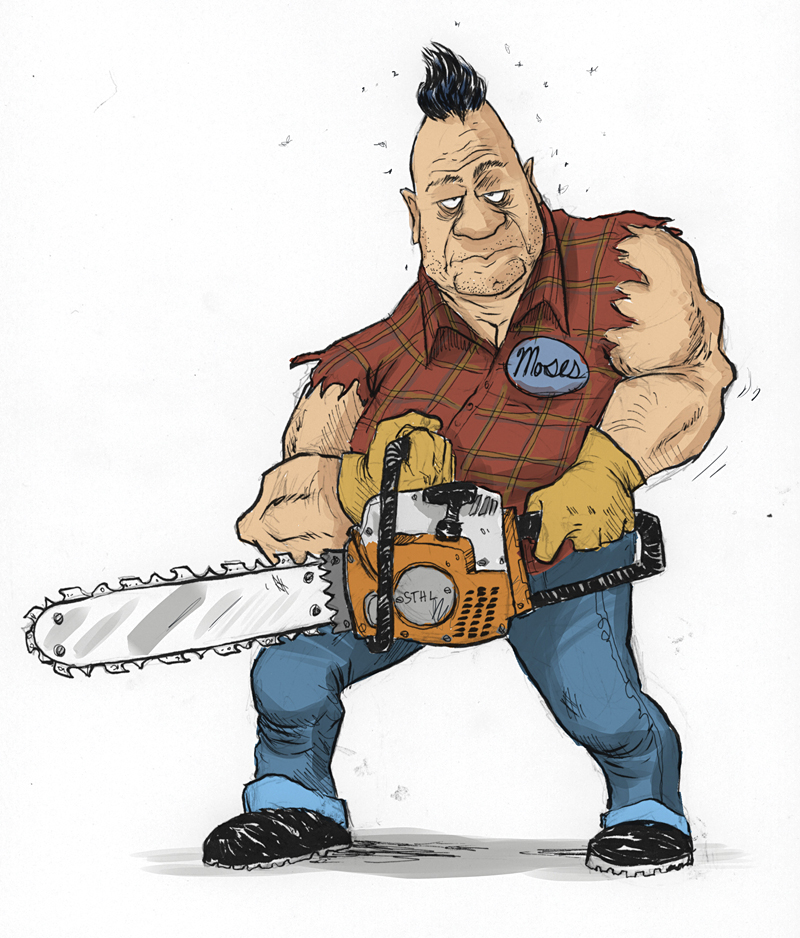When David Moses picks up the phone, he sounds gruff. “I hear you’re trying to get a hold of me,” he says from Virginia, where the mohawked Snoqualmie native is readying himself for the STIHL Timbersports Series Championships this weekend.
Lumberjack sports are in Moses’ blood. His dad, David Sr., has been involved with competitive sawing and hacking since 1972. David Jr. tells me his father still competes at age 68. Twenty years ago David Jr. approached his old man and expressed an interest in continuing the tradition. While his father was initially skeptical, David Jr. soon proved he was serious. “He’s the only one I trusted to teach me,” says Moses.
Apparently the lessons stuck. With two decades of competitive lumberjacking under his belt, Moses took first place in the regional Western Qualifier earlier this spring, earning a trip to Pigeon Forge, Tenn., and the Great Smoky Mountain Lumberjack Feud. Here, on June 1–3, 20 of the country’s top lumberjack athletes will do battle, with the winner earning an invitation to the STIHL Timbersports World Championships in Lillehammer, Norway, this September.
This weekend competitors will compete in six historic lumberjack disciplines, including flannel-ready events like the hot saw, the springboard chop, the standing block chop, the stock saw, and the underhand chop.
Moses says the springboard chop is his favorite. “It’s the most challenging,” says Moses, who, presumably like most lumberjacks, is a man of few words. “I have the most fun with it.”
While many have seen a lumberjack competition while channel-surfing, or perhaps even witnessed one in person in a town like Morton (home to the annual Morton Loggers Jubilee), few appreciate what the life of a competitive lumberjack is really like. Moses says he competes in 12 to 16 events, mostly regional, each year, and, if all goes as planned, takes home enough in prize money to help balance the lean times in the tile business he runs with his wife. Moses says that in the past he competed in 20 to 24 events a year, a number whittled down when the economy tanked and a handful of competitions ceased.
Moses says big-time competitions usually offer a winner’s payout of around $600. A smaller competition, like the Sequim Irrigation Festival, might offer closer to $50. “It covers gas money,” Moses says.
In other words, these are not rich, pampered athletes. But, judging by Moses, they are serious about their sport. With a training spot near the old Weyerhaeuser mill on Snoqualmie Ridge, Moses says he’s ready to achieve competitive-lumberjacking greatness. While he was close to making it to the U.S. finals in 2011, Moses believes the countless hours of training he’s put in this year will put him over the top. “Really good,” Moses says, when asked to assess his chances. “As long as I keep doing what I’ve been doing, I’ll be fine.” He notes it took him 12 years just to get “pretty good” at competitive lumberjacking. Now in his 20th year, he says he’s “right up there with the big boys.”
Moses believes the cross-training he did in preparation for this season may make the difference. You have to be “in fairly good shape,” he says (with a hint of humor), to handle the physical requirements of competitive lumberjacking.
“It’s hours of preparation for a few seconds of glory,” Moses says. “If you get the glory.”








